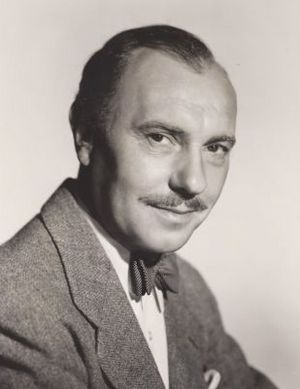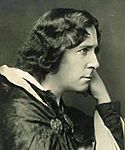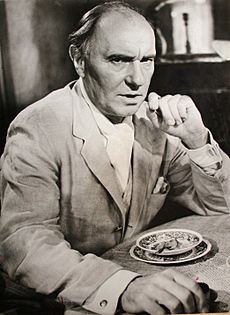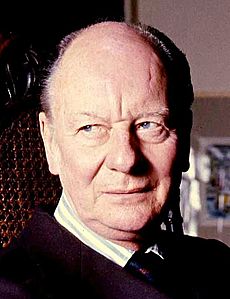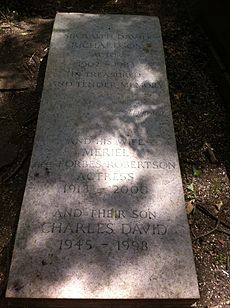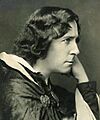Ralph Richardson facts for kids
Sir Ralph Richardson (born December 19, 1902 – died October 10, 1983) was a famous English actor. He was one of the three most important male actors on the British stage for much of the 20th century, alongside John Gielgud and Laurence Olivier. He also acted in over sixty films during his career.
Ralph Richardson didn't plan to be an actor at first. He came from an artistic family, but not one involved in theatre. However, after seeing a play called Hamlet in Brighton, he was inspired to become an actor. He learned his skills in the 1920s by working with a touring theatre group and later at the Birmingham Repertory Theatre.
In 1931, he joined the Old Vic theatre company, where he mostly played roles from Shakespeare's plays. The next year, he became the leader of the company, taking over from John Gielgud, who had taught him a lot about acting. After leaving the Old Vic, he became a big star in London's West End and on Broadway in New York.
In the 1940s, Ralph Richardson, Laurence Olivier, and John Burrell were the co-directors of the Old Vic company. Some of his most famous roles there were Peer Gynt and Falstaff. He and Olivier even took the company on tours to Europe and Broadway in 1945 and 1946. Their success, however, led to them being let go from the company in 1947.
During the 1950s, Richardson continued to act in both new and classic plays in the West End. He appeared in plays like The Heiress and Home at Seven. He kept acting on stage and in films until he passed away suddenly at age eighty. Later in his career, he was well-known for his work with Peter Hall's National Theatre. He also often performed with his friend John Gielgud. Ralph Richardson was not famous for playing very serious, tragic roles. Instead, he preferred playing interesting "character" parts in both old and new plays.
Ralph Richardson's film career started in 1931, where he was an extra. Soon, he was given main roles in British and American movies. These included Things to Come (1936), The Fallen Idol (1948), Long Day's Journey into Night (1962), and Doctor Zhivago (1965). He won many awards and was nominated for others in the UK, Europe, and the US for his acting on stage and screen. He was nominated twice for the Academy Award for Best Supporting Actor. The first was for The Heiress (1949) and the second was after he died, for his last film, Greystoke: The Legend of Tarzan, Lord of the Apes (1984).
Throughout his life, Ralph Richardson was known for his unusual behavior both on and off stage. People often saw him as someone who looked at the world in a unique way. His acting was often described as poetic or magical.
Contents
- Life and Career Highlights
- Early Life and Discovering Acting
- Starting His Acting Career
- The Old Vic Years (1930–1932)
- Becoming a Star in London and Broadway
- World War II Service
- Leading the Old Vic (1944–1947)
- Becoming Internationally Famous
- The 1960s: Films and New Roles
- The 1970s: New Collaborations and Films
- Later Career and Final Years (1975–1983)
- His Personality and Acting Style
- Images for kids
- See also
Life and Career Highlights
Early Life and Discovering Acting
Ralph Richardson was born in Cheltenham, Gloucestershire, England, on December 19, 1902. He was the youngest of three sons. His parents, Arthur and Lydia Richardson, had met in Paris while studying art. His father was a senior art teacher at Cheltenham Ladies' College.
In 1907, his parents separated. Ralph stayed with his mother, Lydia. They moved around a lot, living in different places. One of their first homes was a bungalow made from two old railway carriages in Shoreham-by-Sea.
Lydia wanted Ralph to become a priest. He enjoyed being an altar boy in Brighton. But when he was about fifteen, he was sent to a seminary for priests and ran away. He wasn't very interested in most school subjects. He often made up parts of Latin responses during church services when he couldn't remember them. This skill of inventing things when he forgot proved useful later in his acting career.
I was too lazy to be a painter... I hadn't the persistency – but then I hadn't got very much talent.
time at art school
In 1919, at age sixteen, Richardson got a job as an office boy at an insurance company in Brighton. The pay was good, but he didn't like office work. He often sent documents to the wrong people and played pranks. When his grandmother died, she left him £500. He later said this money changed his life. He quit his office job and enrolled at the Brighton School of Art. However, he soon realized he wasn't creative enough and his drawing skills weren't good.
In 1920, Richardson left art school. He thought about becoming a pharmacist or a journalist, but found both required too much study. He was still unsure what to do until he saw Sir Frank Benson perform as Hamlet in a play. He was so excited that he immediately knew he had to become an actor.
With some of his grandmother's money left, Richardson decided to learn acting. He paid a local theatre manager, Frank R. Growcott, to teach him. He made his first stage appearance in December 1920 in Brighton. He played a gendarme (a type of police officer) in a play based on Les Misérables. Soon, he was given bigger roles, like Banquo in Macbeth.
Starting His Acting Career
In the 1920s, touring theatre companies were still popular. Ralph Richardson wrote to several managers. Charles Doran hired him for £3 a week. Richardson made his professional acting debut in August 1921 in The Merchant of Venice. He stayed with Doran's company for two years, getting more important roles like Mark Antony in Julius Caesar.
Doran's company mainly performed classic plays by Shakespeare. After two years in period costumes, Richardson wanted to act in a modern play. He left Doran in 1923 and toured in Outward Bound. In 1924, he returned to classic plays. While on tour, he married Muriel Hewitt, an actress he knew as "Kit." They worked together for most of 1925 with Sir Barry Jackson's company.
In December 1925, they joined the main company in Birmingham. Richardson learned from older actors like Gerald du Maurier. Muriel Hewitt was seen as a rising star, but Richardson's talent wasn't as clear yet. He played supporting roles like Lane in The Importance of Being Earnest.
Richardson made his London debut in July 1926. He then toured for three months. His next play, Yellow Sands, opened in London in November 1926 and ran for 610 performances. This was his longest-running play in London. During this time, his wife, Muriel, started showing signs of a serious illness called encephalitis lethargica.
In March 1928, Richardson left Yellow Sands and worked with H. K. Ayliff again. He acted with Laurence Olivier in Back to Methuselah. Critics started to notice Richardson and gave him good reviews. He played Tranio in The Taming of the Shrew as a cheerful cockney, which critics loved. For the rest of 1928, he appeared in several modern plays. In 1929, he toured South Africa. He also appeared in a musical comedy called Silver Wings, but he wasn't known for his singing! In May 1930, he played Roderigo in Othello with Paul Robeson and Peggy Ashcroft. Ashcroft's performance was praised, and she and Richardson became good friends and worked together often.
The Old Vic Years (1930–1932)
In 1930, Richardson joined The Old Vic company. This theatre, located south of the Thames, offered affordable tickets for plays and operas. The theatre's producer, Harcourt Williams, had convinced young star John Gielgud to lead the drama company. Williams wanted Richardson to join and eventually take over from Gielgud. Richardson agreed, even though he wasn't sure about acting mostly Shakespeare. He also wasn't very excited about working with Gielgud at first.
The first play of the season was Henry IV, Part 1. Gielgud played Hotspur, and Richardson played Prince Hal. Critics thought Richardson's performance was funny but more like modern comedy than Shakespeare. However, their relationship and Richardson's acting improved when Gielgud helped him with his role as Caliban in The Tempest.
Richardson said Gielgud gave him many ideas, and he realized Gielgud knew a lot about plays. From then on, they became good friends. Their friendship and professional partnership lasted until Richardson's death. Gielgud later wrote that Richardson was an "inspiring and generous partner" and a "great gentleman."
One of Richardson's other roles in his first Old Vic season was Enobarbus in Antony and Cleopatra, which received very good reviews. In 1931, the Old Vic reopened Sadler's Wells Theatre with Twelfth Night. Gielgud played Malvolio, and Richardson played Sir Toby Belch. A critic wrote that Richardson's Sir Toby was "ripe, rich and mellow" and worth traveling far to see.
During the summer break, Richardson acted at the Malvern Festival. Salaries at the Old Vic were not high, so Richardson was happy to get a job as an extra in the 1931 film Dreyfus. His wife's health was getting worse, and he needed money for her nursing care.
When Richardson took over from Gielgud as the Old Vic's main actor, he had a varied season. Some plays were very successful, while others were not. The Knight of the Burning Pestle was a big hit, as was a return of Twelfth Night, with Edith Evans as Viola and Richardson again as Sir Toby.
Becoming a Star in London and Broadway
In August 1932, Richardson returned to the Malvern Festival. He was in four plays, and one of them, Bernard Shaw's Too True to Be Good, moved to London. The play itself wasn't popular, but Richardson's performance was a huge success. He became a star in London's West End. In 1933, he had his first speaking role in a film, playing the villain in The Ghoul. The next year, he got his first starring role in a film, playing the hero in The Return of Bulldog Drummond.
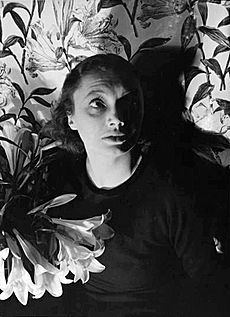
Over the next two years, Richardson appeared in six plays in London. These ranged from Peter Pan (where he played Mr. Darling and Captain Hook) to Cornelius, a play written for him by J.B.Priestley. Cornelius ran for two months, which was less than expected. This left Richardson with free time in 1935. He used this time to accept an invitation from Katharine Cornell to play Mercutio in Romeo and Juliet on a US tour and on Broadway. American critics were very impressed with his performance.
In 1936, the film Things to Come was released. Richardson played a warlord named "The Boss." His performance was so good at making fun of the Italian dictator Benito Mussolini that the film was banned in Italy. The film's producer, Alexander Korda, became a long-time friend and supporter of Richardson.
In May 1936, Richardson and Olivier worked together again. They directed and starred in a new play by Priestley, Bees on the Boatdeck. Both actors received excellent reviews, but the play itself wasn't popular and closed after four weeks. This was one of several plays where Richardson was praised, but the play didn't do well financially. In August 1936, he finally had a long-running hit: The Amazing Dr Clitterhouse, which ran for 492 performances.
After a short play, Richardson returned to the Old Vic for the 1937–38 season. He played Bottom again and switched roles in Othello, playing Othello himself, with Olivier as Iago. The director wanted to try out a new idea about Iago's character, but Richardson wasn't keen on it. Critics felt Richardson's Othello was not strong enough. He never played Hamlet or King Lear because he felt those characters' intense passions were too different from his own personality.
Richardson made his television debut in January 1939. His last stage role in the 1930s was Robert Johnson in Priestley's Johnson Over Jordan. This was an experimental play with music and dance. Again, Richardson was highly praised, but the play didn't do well. After it closed in May 1939, he didn't act on stage for over five years.
World War II Service
When World War II started, Richardson joined the Royal Naval Volunteer Reserve as a pilot. He had taken flying lessons before the war, but he admitted he was a nervous pilot. He was lucky to be accepted, as the navy needed pilots. He rose to the rank of lieutenant-commander. His work was mostly office tasks, probably because he often crashed planes! This earned him the nickname "Pranger" Richardson. In April 1941, he welcomed Olivier, who had also joined the navy. Olivier soon crashed even more planes than Richardson.
In 1942, Richardson crashed his motorcycle and was in the hospital for several weeks. His wife, Kit, was able to visit him. But later that year, her health worsened, and she passed away in October. He felt very lonely, but the friendship of his navy colleagues helped. In 1944, he married again. His second wife was actress Meriel Forbes. This marriage brought him great happiness and a son, Charles (born 1945).
During the war, Richardson hosted shows to boost morale and made a few films. These included The Silver Fleet, where he played a Dutch Resistance hero, and The Volunteer, a propaganda film where he played himself.
Throughout the war, the Old Vic theatre struggled. In 1942, German bombs almost destroyed the theatre. By 1944, the war was turning, and the Old Vic wanted to restart in London. They asked Richardson to lead the company. Richardson had two conditions: first, the Old Vic board had to arrange his release from the military. Second, he wanted to share the acting and management with two others. He first suggested Gielgud and Olivier, but Gielgud refused, saying he would have to spend all his time breaking up arguments between them. So, the stage director John Burrell became the third member. The navy quickly agreed to release Richardson and Olivier.
Leading the Old Vic (1944–1947)
The three leaders of the Old Vic found a new theatre for their first season. They hired a strong group of actors. They decided to open with four plays: Peer Gynt, Arms and the Man, Richard III, and Uncle Vanya. Richardson played Peer, Bluntschli, Richmond, and Vanya. Olivier played other key roles. The first three plays were highly praised. Uncle Vanya received mixed reviews. One newspaper thought Richardson's Vanya was "the perfect compound of absurdity and pathos." In 1945, the company toured Germany and Paris. A critic wrote that Richardson and Olivier quickly made the Old Vic "the most famous theatre in the Anglo-Saxon world."
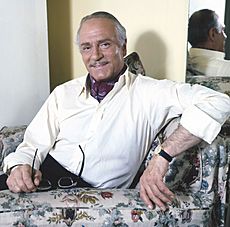
The second season in 1945 featured two sets of two plays. The first set was Henry IV, Parts 1 and 2. Olivier played Hotspur in the first part and Justice Shallow in the second. He received good reviews, but everyone agreed that Richardson's performance as Falstaff was the highlight. A critic wrote, "He had everything the part wants – the exuberance, the mischief, the gusto." The director Peter Hall saw this performance as a teenager and said fifty years later, "Of the performances I've seen in my life I'm gladdest I saw that." In the second set of plays, Olivier was the star in Oedipus Rex and The Critic. Richardson played supporting roles. After the London season, the company performed these plays on Broadway in New York.
The third and final season under the three directors was in 1946–47. Olivier played King Lear, and Richardson played Cyrano de Bergerac. Richardson's other roles included Inspector Goole in An Inspector Calls and John of Gaunt in Richard II, which he also directed.
While performing Cyrano, Richardson was made a knight by the King in 1947. This made Olivier a bit jealous, but Olivier received the same honor six months later. However, the Old Vic's new chairman, Lord Esher, didn't like how famous the two actors had become. He wanted to run the National Theatre himself and didn't want actors in charge. So, he ended their contracts, and they "resigned."
Looking back, many people agreed that the Old Vic company from 1944 to 1947 was one of the best ever in Britain.
Becoming Internationally Famous
Leaving the Old Vic meant Richardson could finally earn much more money. The Old Vic's highest salary was £40 a week. After his last Old Vic season, he made two films for producer Alexander Korda. The first, Anna Karenina, was expensive and didn't do well, but Richardson's acting was excellent. The second, The Fallen Idol, was a big success and won awards. It remained one of Richardson's favorite films.
Films helped Richardson become famous around the world. He respected film acting, saying it was "a marvellous medium." The Fallen Idol led to Richardson's first Hollywood role. He played Dr. Sloper in The Heiress, a film based on a novel. The film didn't make much money, but it received good reviews. Olivia de Havilland won an Academy Award for Best Actress, and Richardson was nominated for his role.
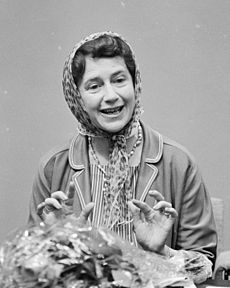
The Heiress had been a Broadway play before it was a film. Richardson liked his part so much that he decided to play it in London's West End, with Peggy Ashcroft as his daughter. The play was a huge success and ran for 644 performances.
After The Heiress, Richardson starred in another long-running play, Home at Seven, in 1950. He later played the part in a radio show and in a film version, which he also directed. When he was in a long-running play, Richardson could also work on films during the day. He made two other films in the early 1950s: Outcast of the Islands and The Sound Barrier. For The Sound Barrier, he won the BAFTA Award for Best Actor.
Richardson liked to switch between modern and classic roles. His next stage role was Colonel Vershinin in Three Sisters in 1951. He was part of a strong cast, but some critics felt Richardson didn't hide his positive personality enough to play the ineffective Vershinin. He didn't act in another Chekhov play for over twenty-five years.
In 1952, Richardson performed at the Stratford-upon-Avon Festival, known for Shakespeare. People were excited for his return to Shakespeare, but his performances were disappointing. He received poor reviews for his Prospero in The Tempest. His Macbeth was also considered a failure. Critics felt he wasn't convincing as a villain. His third role, Volpone, received better but not amazing reviews. He never played at Stratford again.
Back in the West End, Richardson was in another play in 1953. In November of that year, he and Gielgud starred together in A Day by the Sea, which ran for 386 performances. During this time, Richardson also played Dr Watson in a radio show about Sherlock Holmes, with Gielgud as Holmes.
In 1954 and 1955, Richardson and his wife toured Australia with Sybil Thorndike and her husband. They performed plays like The Sleeping Prince. The next year, he worked with Olivier again in the 1955 film of Richard III. Olivier, who directed, was annoyed that Richardson insisted on playing his character, Buckingham, in a sympathetic way.
Richardson turned down the role of Estragon in the first English performance of Samuel Beckett's Waiting for Godot in 1955. He later regretted missing this chance to be in "the greatest play of my generation." He had asked Gielgud, who called the play "rubbish." Even after talking to the author, Richardson couldn't understand the play.
Richardson's return to the Old Vic in 1956 in Timon of Athens was well received. He was also nominated for a Tony Award in 1957 for his Broadway performance in The Waltz of the Toreadors. He ended the 1950s with two successful plays in the West End: Flowering Cherry and The Complaisant Lover. Flowering Cherry ran for 435 performances. The Complaisant Lover was a surprise hit, running for 402 performances. While performing this play, Richardson also worked on the film Our Man in Havana.
The 1960s: Films and New Roles
Richardson started the 1960s with a play that critics hated. He only took the role to act with Gielgud, but both quickly regretted it. Richardson then went to the US to appear in the film Long Day's Journey into Night (1962) with Katharine Hepburn. The director, Sidney Lumet, said Richardson needed very little guidance. Richardson won the Cannes Film Festival's Best Actor prize along with his co-stars.
Richardson's next stage role was in a famous revival of The School for Scandal in 1962, directed by Gielgud. They took the play on a North American tour. A play called Six Characters in Search of an Author in 1963 was considered a highlight of his work in the 1960s. In 1964, Richardson toured South Africa and Europe, playing Bottom again and Shylock in The Merchant of Venice.
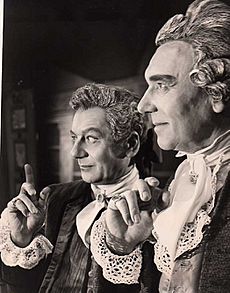
For his next four stage plays, Richardson was at the Haymarket Theatre. Father Carving a Statue (1964) was short-lived. He had more success in Shaw's You Never Can Tell (1966) and as Sir Anthony Absolute in The Rivals (1966). A critic wrote that Richardson's Sir Anthony was "choleric and gouty" but also showed his love for his son. In 1967, he played Shylock again. This was the last time he acted in a Shakespeare play on stage.
Richardson made thirteen films during the 1960s. He played historical figures like Sir Edward Carson in Oscar Wilde (1960) and W.E.Gladstone in Khartoum (1966). He was very careful about historical accuracy in his roles. In 1965, he played Alexander Gromeko in David Lean's Doctor Zhivago, a very successful film. This film, along with The Wrong Box and Khartoum, earned him a BAFTA nomination for best leading actor in 1966.
In 1964, Richardson was the voice of General Haig in a BBC documentary series called The Great War. In 1967, he played Lord Emsworth on BBC television in stories based on PGWodehouse's Blandings Castle. He was nervous about acting in a TV series because he was 64. Critics had mixed opinions about his TV performances.
Richardson also made many sound recordings. He recorded his role as Cyrano de Bergerac and played the title role in a full recording of Julius Caesar. He also recorded English Romantic poetry and narrated Peter and the Wolf for music albums.
Richardson's last stage role of the decade was in 1969 in What the Butler Saw. It was a big failure, and the audience clearly disliked it.
The 1970s: New Collaborations and Films
In 1970, Richardson acted with Gielgud again in David Storey's play Home. The play is set in a nursing home for mental patients. The two elderly men talk in a rambling way. Critics praised their performances. One wrote that they gave "two of the greatest performances of two careers." The original cast also recorded the play for television in 1972.
In 1971, Richardson starred in another play. Then, in July 1972, he surprised many by joining Peggy Ashcroft in a comedy called Lloyd George Knew My Father. Some critics felt the play was too simple for its two stars, but others thought Richardson found hidden depths in his character. The play was a hit with the public. Richardson later toured the play in Australia and Canada with his wife.
Richardson's film roles in the early 1970s were varied. He played the Crypt Keeper in Tales from the Crypt (1972), the Caterpillar in Alice's Adventures in Wonderland (1972), and Dr. Rank in A Doll's House (1973). For A Doll's House, his performance received good reviews. In 1973, Richardson was nominated for a BAFTA award for his role as George IV in Lady Caroline Lamb, which also featured Olivier.
Later Career and Final Years (1975–1983)
Peter Hall, who took over from Olivier as director of the National Theatre, wanted Richardson, Ashcroft, and Gielgud to join the company. In 1975, he successfully offered Richardson the main role in Ibsen's John Gabriel Borkman. This production was one of Hall's early successes. A critic wrote that Richardson's Borkman was "both moral monster and self-made superman."
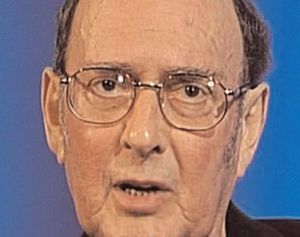
Richardson continued his stage partnership with Gielgud in Harold Pinter's No Man's Land (1975) at the National Theatre. Gielgud played Spooner, and Richardson played Hirst, a rich but lonely writer. The play had both comedy and sadness. One critic called their performance "the funniest double-act in town." Peter Hall said that no other actor could show Hirst's loneliness and creativity like Ralph. The play was very successful and was performed at several theatres, on Broadway, and on television over three years.
After No Man's Land, Richardson returned to a light comedy called The Kingfisher. It was about an old love affair that restarts. It ran for six months. He then returned to the National Theatre and to Chekhov in 1978, playing Firs in The Cherry Orchard. His next West End play, Alice's Boys, was terrible. A story goes that during one performance, Richardson walked to the front of the stage and asked, "Is there a doctor in the house?" When a doctor stood up, Richardson sadly said, "Doctor, isn't this a terrible play?"
After this failure, most of Richardson's remaining stage career was at the National Theatre. He played roles in The Double Dealer (1978), The Fruits of Enlightenment (1979), The Wild Duck (1979), and Early Days, a play written especially for him. His final West End play was The Understanding (1982). His co-star, Celia Johnson, died suddenly just before the first night.
Films Richardson appeared in during the late 1970s and early 1980s include Rollerball (1975), The Man in the Iron Mask (1977), Dragonslayer (1981) where he played a wizard, and Time Bandits (1981) where he played the Supreme Being. In 1983, he was in Wagner, a very long film starring Richard Burton. This film was special because Gielgud, Olivier, and Richardson all appeared in scenes together for the only time in a film. For television, Richardson played Simeon in Jesus of Nazareth (1977) and appeared in the 1981 Morecambe and Wise Christmas Show.
In Witness for the Prosecution, a TV remake of a 1957 film, he played a lawyer. Richardson's last two films were released after he died: Give My Regards to Broad Street with Paul McCartney, and Greystoke, a Tarzan story. In Greystoke, Richardson played the old Lord Greystoke. He was nominated for an Academy Award after his death for this role. The film was dedicated to him.
Richardson's very last stage role was in Inner Voices in 1983. His performance was highly praised. The play was scheduled to tour in October. Just before the tour, Richardson suffered several strokes and passed away on October 10, at the age of eighty. All the theatres in London dimmed their lights to honor him. He was buried in Highgate Cemetery, and a memorial service was held at Westminster Abbey.
His Personality and Acting Style
Ralph Richardson was a very private person, but also very unusual and flamboyant. People often said he wasn't quite like other people. His unique behavior never became just simple eccentricity. He would introduce his pet ferrets by name, ride his powerful motorcycle at high speed in his seventies, have a parrot flying around his study eating his pencils, or take a pet mouse for a walk. But behind these unusual actions, he kept his true self hidden, even from his closest friends.
Richardson wasn't known for his political views. He was a Roman Catholic as a boy but later became less religious. However, he eventually found his way back to faith. He loved painting and listed it and tennis as his hobbies.
Director Peter Hall said Richardson was "the greatest actor I have ever worked with." Another director, David Ayliff, said Ralph was a "natural actor" who couldn't stop being perfect, while Olivier worked very hard. A critic named Harold Hobson said that Olivier made audiences feel less important, but Richardson always made them feel more important.
Richardson believed he wasn't suited for very serious, tragic roles, and most critics agreed. But many thought he was unmatched in classic comedies. Kenneth Tynan thought Richardson's Falstaff was "matchless." Richardson himself was rarely happy with his own performances, but he seemed to think he did well as Falstaff. He refused to play the part again, saying, "Those things I've done in which I've succeeded a little bit, I'd hate to do again."
A younger actor, Albert Finney, said Richardson wasn't really an actor but a magician. Many people who worked with Richardson used the word "magical" to describe his acting. The Guardian newspaper called Richardson "our most poetic actor." The Times said he was perfect at making an ordinary character seem extraordinary, or an extraordinary one seem ordinary. Richardson himself said acting was "merely the art of keeping a large group of people from coughing" or, sometimes, "dreaming to order."
Kenneth Tynan, a critic, felt there was something godlike about Richardson, like a "whimsical, enigmatic magician." Harold Hobson wrote that Richardson, even if he didn't succeed in heroic roles, had a special "revelation" in his acting. He said, "There are more graceful players than he upon the stage; there is none who has been so touched by Grace."
Images for kids
-
The Old Vic (photographed in 2012)
-
Peggy Ashcroft in 1936
See also
 In Spanish: Ralph Richardson para niños
In Spanish: Ralph Richardson para niños
- List of British actors
- List of British Academy Award nominees and winners
- List of oldest and youngest Academy Award nominees – Oldest nominees for Best Actor in a Supporting Role
- List of actors with Academy Award nominations
 | Charles R. Drew |
 | Benjamin Banneker |
 | Jane C. Wright |
 | Roger Arliner Young |


